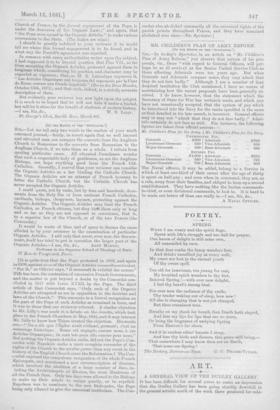[TO THE EDITOR OF THE "SPECTATOR."]
SIE,—Let me tell only two words to the readers of your much -esteemed journal,—firstly, to assert again that no well learned and educated man can compare the converts from the Anglican 'Church to Romanism to the converts from Romanism to the Anglican Church, if we take them as a whole. I refrain from -quoting particular cases. All educated Frenchmen wonder that such a respectable body of gentlemen, as are the Anglican Bishops, can hope anything good from the French Old- Catholics. Secondly, I marvel that your reviewer can consider the Organic Articles as a law binding the Catholic Church. The Organic Articles arc an attempt of French tyranny to fetter the Catholic Church, but the Catholic Church has never accepted the Organic Articles.
I could quote, not by units, but by tens and hundreds, docu- ments from the Holy See or from eminent French Catholics, .cardinals, bishops, clergymen, laymen, protesting against the Organic Articles, The Organic Articles may bind the French 'Catholics, as French citizens, but they hint them only so long and so far as they are not opposed to conscience, that is, to a superior law of the Church, or of the two Powers (the 'Concordat) It would be waste of time and, of space to discuss the cases 'alluded to by your reviewer in the examination of particular 'Organic Articles. I add only that never, even now, the Govern- ment, itself has tried to put in operation the larger part of the
-Organic Articles.—I am, Sir, &c., Aunt: Msirris, Professor in the Superior School of Theology of Paris. 37 Rue de Vaugirard, Paris.
[It is quite true that the Pope protested in 1802, and again 1111809, against Some of the Organic Articles (nonnanos «1./ iculos). "Par lit," as 011ivier says, "il recounait la validit6 des autres," This has been the contention of successive French Governments, and the matter is put beyond a doubt by the Concordat eon- eluded in 1817 with Louis XVIII. by the Pope. The third article of that Concordat says, "Only such of the Organic Articles are abrogated as are in opposition to the doctrine and laws of the Church.". This amounts to a formal recognition on the part of the Pope of such Articles as remaiued in force, and it was to these that our reviewer referred. A similar objection to Mr. Lilly's was made in a debate on the Jesuits, which took place in the French Chambers in May,184.5, and it may interest Mr. Lilly to know how Thiers treated the objection. His words are,—" On a dit Tie l'Eglise avait r6clam6, protest6; c'est uu mensonge historique. Rome est engag6o, comme nom, b ces Articles Organiques ; ils seat lois pour elle comme pour nous." But putting the Organic Articles aside, did not the Pope's Con- cordat with Napoleon make a more complete surrender of the rights of the Church to the secular power than any event in the history of the English Church siuce the Reformation P The C on- -cordat enjoined the compulsory resignation of the whole Preach Episcopate, and sanctioned a now circumscription of dioceses, -which involved the abolition of a large number of Sees, in- hiding the _Archbishopric of Rheims, the most illustrious of all the French Sees. Only ten days were allowed to the Bishops -to make up their minds to resign quietly, or be expelled. Napoleon was to nominate to the now Bishoprics, the Pope being only allowed to give the canonical institution. The Con- cordat also abolished summarily all the canonical rights of the parish priests throughout France, and they have remained abolished ever siuce.—En. Spectator.]


































 Previous page
Previous page